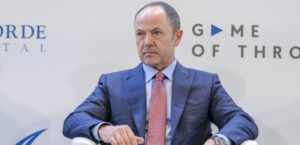
The Cabinet of Ministers has allocated new grants to small businesses totaling 400.5 million UAH, of which about 164.7 million UAH for the creation or development of gardens, berry growing, viticulture and greenhouse farming, the website of the Ministry of Economy reported on Friday.
“Today the government has allocated additional funds for the development of small businesses in agriculture, construction, transport, education, science, etc. This support involves the creation of more than 2 thousand jobs,” the ministry quotes First Deputy Prime Minister – Economy Minister Yulia Sviridenko.
According to the ministry, 92.83 million UAH will be used for horticulture, viticulture and berry growing, 71.9 million UAH – for the creation or development of greenhouses, and 204.4 million UAH of grant funds will be provided for the establishment or development of their own business.
In addition, 62.5 mln UAH of the allocated amount of grant funds will be given to entrepreneurs in agriculture, forestry and fisheries, processing industry, water supply, construction, transport, scientific and technical activities, education, health, art and sports.
As it was reported, eRabota project includes six grant programs aimed at stimulating entrepreneurial activity. These are, in particular, programs of micro grants for starting or developing one’s own business, grants for creating and developing processing enterprises, establishing orchards and vineyards, greenhouse farming, support for IT start-ups and start-ups in IT sphere.
Both current entrepreneurs and people with no business experience can apply for a grant. Applications are accepted through the Diya Portal.

War and the decline of the domestic market force the Ukrainian business to pay maximum attention to expanding exports and entering foreign markets, TAS Group founder Serhiy Tihipko said.
“Now we are starting to create a project as a monobank in Poland – it is a unique product,” he said at the Kiev International Economic Forum (KIEF) in Kiev on Thursday.
Tigipko recalled that currently monobank has 6.5 million customers and a significant part of them abroad.
The businessman said that before the war he did not pay enough attention to the development of export opportunities. “Those businesses that I had focused on the domestic market are a problem,” he described the current situation.
At the same time, Tigipko said that in war conditions it is possible to increase exports, in particular, the group’s wagon building companies have signed two contracts for Europe, one – a startup for the construction of innovative cars.
According to him, apple concentrate, metalware and nails have good prospects.
The businessman also noted the importance of diversification. “We have both industrial and financial (sectors), and agriculture – diversification has worked. I believed in it and I believe in it now,” he stressed.
Tihipko also complained that before the war, he did not pay enough attention to the reserves in case of crises. According to him, if there were more of them, now he could make more profitable deals, but he already bought 49% in one of the companies from one of the partners, and before that he bought a share from another partner because “people are rushing around”.
TAS Group was founded in 1998. The sphere of its business interests covers the financial sector (banking and insurance segments), industry, real estate, venture projects.

Energy supplier YASNO is optimizing schedules of power outages to improve the predictability of businesses affected by them, the company’s CEO Serhiy Kovalenko said.
“The schedules will become more convenient for businesses. Previously, the addresses of legal entities, which were located in separate buildings, were not in the schedules of probable blackouts, so they could not determine when the power would be turned off. Now legal entity addresses are being added to the databases, so scheduling will become easier,” he wrote on Facebook Monday night.
He said work is continuing on the feedback to replenish the list of addresses that the company’s customers provide on the scheduling pages. The database has been updated in recent days – about 400 addresses have been added.
In all, YASNO has plugged emergency schedules as of Monday morning to stabilization schedules. A total of 804,000 points were shut down in three turns during the day and stabilized the system at 378 MW.
“Repairs are ongoing, so this situation will continue for some time. Please be patient,” Kovalenko noted.
Earlier, YASNO pointed out that Kiev usually consumes 1,000-1,200 MW.

Micro and small-sized enterprises in nine regions of Ukraine affected by Russian military aggression can apply for micro-grants in the amount of UAH 125,000 (EUR 4,000) through the Diia government portal, according to the Telegram channel of the Ministry of Digital Transformation of Ukraine.
“Due to the Russian invasion of Ukraine, hundreds of Ukrainian enterprises were forced to stop their work or reduce their activities at times. Therefore, to financially help small business owners who have suffered from Russia’s armed aggression, we are launching grants on the Diia portal,” the ministry said.
According to the report, enterprises that:
– registered no later than December 31, 2021 in Chernihiv, Sumy, Kharkiv, Kherson, Mykolaiv, Zaporizhia, Donetsk, Luhansk and Kyiv regions;
– temporarily moved out of these areas;
– suffered as a result of hostilities, but continue to work and can confirm this.
Priority in the selection is given to companies that produce vital goods for Ukrainians and the Armed Forces of Ukraine. The selection of applications will be handled by a commission of independent business experts.
It is also reported that the grants became available thanks to funding from the European Union and the German government under the technical support program EU4Business: SME Competitiveness and Internationalization, which is implemented in Ukraine by the German federal company Deutsche Gesellschaft für Internationale Zusammenarbeit, (GIZ) GmbH.
The initiators of the program are the Ministry of Digital Transformation, the Ministry of Economy, the Entrepreneurship Promotion Office and Diia Business. The implementing partner of the program is the East Europe Foundation.

Prime Minister of Ukraine Denys Shmyhal says that more than 150,000 businesses are already switching to a new taxation system – 2% of turnover.
“More than 150,000 businesses are already switching to the new taxation system – 2% of turnover,” Shmyhal said in his address on Monday evening.
Also, according to him, the authorities have already received 1,500 applications for the relocation of Ukrainian manufacturing enterprises, and more than 100 enterprises have already moved and are working.
“The sowing campaign has begun. Now it goes to almost all regions of the country. There are seeds, fertilizers, fuel. The state provided farmers with funding for more than UAH 20 billion. Loans for everyone at 0%,” he said.

Some 85% of 355 business representatives polled by Gradus Research with the support of the Kiev School of Economics (KSE) as part of their study partially or completely suspended the work of their companies due to the war.
“The war has made significant changes in the work of Ukrainian business: about 85% of the business stopped working in partial operation or even stopped work altogether, among which 1% stopped their activities and do not plan to resume, and 35% suspended it, waiting for better times,” the authors of the study said. release on the CSE website.
At the same time, sectoral transformation as one of the ways to save a business from closure turned out to be relevant for 37% of the enterprises that took part in the study – in 21% of cases, a business is in the process of sectoral transformation. At the same time, 16% of respondents have completely or partially transformed, and the same number can potentially join this process.
“The most popular business areas since the beginning of the war have been the retail trade in food and non-food products – in total, up to 24% of the businesses that took part in the study account for these two areas,” the release says.
According to Gradus, 86% of businesses are operating with less workload than before the war, but there are those whose workload has even increased.
“As the difficulties that arise in organizing the work of a business, half of the audience cites a lack of orders. Up to a third of respondents (29%) complain about problems with logistics,” the researchers said.
With regard to government assistance, 37% of respondents, according to the results of the study, are counting on tax holidays.
Other expectations include assistance with organizing logistics, access to cheaper finance, product promotion and keeping key employees from going abroad, military service.
The authors of the study note that the difficult times of business significantly affect the financial support of employees and suppliers – 3-5% of businesses pay relatively large payments, 14-19% make payments at the pre-war level. Other businesses have either reduced the share of payments or stopped altogether – 39% do not pay wages, and 29% do not pay suppliers.
The report clarifies that the survey was conducted by the method of self-completion of the questionnaire in a mobile application in cities with a population of more than 50 thousand people, the sample was 355 respondents.